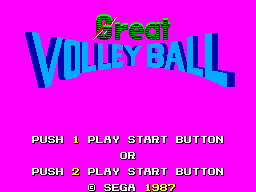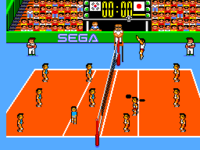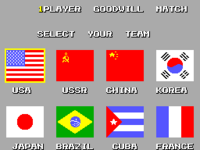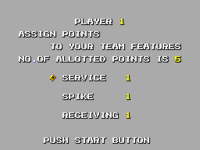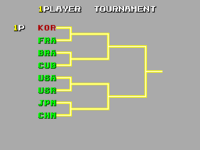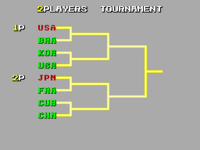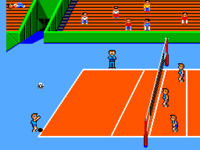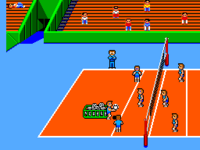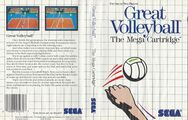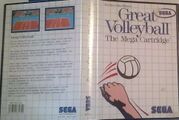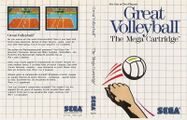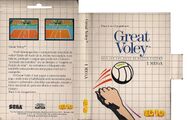Great Volleyball
From Sega Retro
| Great Volleyball | |||||||||||||||||||||||||||||||||||
|---|---|---|---|---|---|---|---|---|---|---|---|---|---|---|---|---|---|---|---|---|---|---|---|---|---|---|---|---|---|---|---|---|---|---|---|
| System(s): Sega Master System | |||||||||||||||||||||||||||||||||||
| Publisher: Sega Enterprises, Ltd. (JP, EU), Sega of America (US) | |||||||||||||||||||||||||||||||||||
| Developer: Sanritsu[1] | |||||||||||||||||||||||||||||||||||
| Distributor: Tec Toy (BR), Korea Oacs (KR) | |||||||||||||||||||||||||||||||||||
| Genre: Sports[2] (volleyball) | |||||||||||||||||||||||||||||||||||
| Number of players: 1-2 | |||||||||||||||||||||||||||||||||||
|
Great Volleyball (グレートバレーボール) is a sports game developed by Sanritsu and published by Sega for the Sega Master System. It was released internationally as part of the Great series of sports games.
Contents
Gameplay
The game is an indoor volleyball game using an isometric view of the court. It can be played by one or two players. There are eight teams, representing different countries, and teams consist of six players. After selecting a team, players get points that can be allocated to three categories:
- Service: Increases the speed of serves.
- Spike: Increases the speed of spikes.
- Receiving: Increases the movement speed of players.
On the title screen, one-player games are started by pressing ![]() on the first control pad, and two-player games are started by pressing
on the first control pad, and two-player games are started by pressing ![]() on the second control pad.
on the second control pad.
Matches are divided into sets, and the team to win two out of three sets wins the match. Sets are won by earning 15 points and scoring two consecutive points. Each set opens with a serve, where one player from the serving team stands on the edge of the court. The player moves using the D-Pad, tosses the ball by pressing ![]() , then serves the ball by holding the D-Pad while pressing
, then serves the ball by holding the D-Pad while pressing ![]() . The team that serves the ball can earn a point if the ball lands on the opposing team's side of the court (or if the opposing team knocks the ball out of bounds). The team can serve again if they score a point. The opposing team gets to serve the ball (but does not earn a point) if the ball lands on the serving team's side of the court (or if the serving team knocks the ball out of bounds). Teams switch sides of the court with each set (with the team on the left side of the court always getting the opening serve); on the third set, teams switch sides again when one team reaches 8 points. After an error has been made (losing a point or a serve), a player can call a timeout (up to two times per set) by pressing
. The team that serves the ball can earn a point if the ball lands on the opposing team's side of the court (or if the opposing team knocks the ball out of bounds). The team can serve again if they score a point. The opposing team gets to serve the ball (but does not earn a point) if the ball lands on the serving team's side of the court (or if the serving team knocks the ball out of bounds). Teams switch sides of the court with each set (with the team on the left side of the court always getting the opening serve); on the third set, teams switch sides again when one team reaches 8 points. After an error has been made (losing a point or a serve), a player can call a timeout (up to two times per set) by pressing ![]() before the judge blows the whistle, during which the player can reallocate team points.
before the judge blows the whistle, during which the player can reallocate team points.
When receiving the ball, the player can initially move the three players closest to the net using the D-Pad. Pressing ![]() alternates between all three forward players moving together or only two players moving together (with the third tailing from a distance). The players in the back become controllable if the ball reaches them. The ball casts a shadow, so the player can predict where it will land and move the players to intercept it. As the ball is coming down, the player can hit the ball by pressing
alternates between all three forward players moving together or only two players moving together (with the third tailing from a distance). The players in the back become controllable if the ball reaches them. The ball casts a shadow, so the player can predict where it will land and move the players to intercept it. As the ball is coming down, the player can hit the ball by pressing ![]() .
.
The player can set the ball (push it back into the air toward an opposing team member with both hands) by holding the D-Pad toward the opposing team member and pressing ![]() . This can be used to set up a spike (hard hit) or dink (light tap). The player can jump by pressing
. This can be used to set up a spike (hard hit) or dink (light tap). The player can jump by pressing ![]() . While in the air, the player can spike the ball by holding the D-Pad
. While in the air, the player can spike the ball by holding the D-Pad ![]() ,
, ![]() , or toward the net and pressing
, or toward the net and pressing ![]() or dink the ball by holding the D-Pad away from the net (including the diagonal directions) and pressing
or dink the ball by holding the D-Pad away from the net (including the diagonal directions) and pressing ![]() . The defending team can block a spike or a dink by pressing
. The defending team can block a spike or a dink by pressing ![]() when the players are in position.
when the players are in position.
Modes
The game has the following modes:
- Practice: A practice mode where the player can practice serving or spiking.
- Goodwill Match (one-player) or 1P vs 2P (two-player): A single match between two teams. Players get five points that be can assigned to team features. In one-player games, the player competes against a computer player (and chooses both teams); in two-player games, the two players compete against each other (and choose their own teams).
- Tournament Play: A tournament where players must win three matches to win. Players are eliminated after losing a single match. Players get four points that can be assigned to team features, and winning a game earns another two points that can be spent. In one-player games, the player competes against computer players; in two-player games, both players take turns playing games against computer players and finish with a match against each other (unless one or both players are eliminated first).
Teams
Great Volleyball features eight national teams:
 USA
USA USSR
USSR China
China Korea
Korea Japan
Japan Brazil
Brazil Cuba
Cuba France
France
Production credits
- Music: Tokuhiko Uwabo[5]
Magazine articles
- Main article: Great Volleyball/Magazine articles.
Physical scans
| ExpandSega Retro Average |
|---|
| 61 | |
|---|---|
| Based on 11 reviews | |
Technical information
ROM dump status
| System | Hash | Size | Build Date | Source | Comments | |||
|---|---|---|---|---|---|---|---|---|
| ? | 128kB | Cartridge (EU/US) | ||||||
| ? | 128kB | Cartridge (JP) |
References
- ↑ http://gdri.smspower.org/wiki/index.php/Sanritsu
- ↑ Jump up to: 2.0 2.1 https://sega.jp/history/hard/mastersystem/software.html (Wayback Machine: 2019-12-31 02:27)
- ↑ Computer Entertainer, "August 1987" (US; 1987-08-xx), page 13
- ↑ ACE, "January 1989" (UK; 1989-xx-xx), page 166
- ↑ File:SSG100030AC_music_jp_booklet.pdf, page 7
- ↑ Complete Guide to Consoles, "Volume IV" (UK; 1990-11-xx), page 99
- ↑ The Complete Guide to Sega, "" (UK; 1991-05-xx), page 57
- ↑ Console XS, "June/July 1992" (UK; 1992-04-23), page 141
- ↑ Mean Machines Sega, "October 1992" (UK; 1992-09-xx), page 133
- ↑ Power Play, "Ausgabe 1" (DE; 1987-11-27), page 98
- ↑ S: The Sega Magazine, "August 1990" (UK; 1990-07-05), page 18
- ↑ Sega Power, "October 1991" (UK; 1991-09-05), page 57
- ↑ Sega Pro, "Christmas 1991" (UK; 1991-12-12), page 43
- ↑ Sega Pro, "April 1993" (UK; 1993-03-11), page 71
- ↑ Tilt, "Mai 1988" (FR; 1988-0x-xx), page 100
- ↑ Tilt, "Julliet/Août 1988" (FR; 1988-0x-xx), page 80
| CollapseGreat Volleyball | |
|---|---|
|
Main page | Comparisons | Development | Magazine articles | Reception | |
| CollapseGames in the Great sports series |
|---|
| Soccer (1985) | Baseball (1985) | Tennis (1985) | Golf (1986) | Ice Hockey (1986) | Baseball (1987) | Basketball (1987) | Volleyball (1987) | Football (1987) | Golf (1987) |
- 1-2 player games
- JP Master System games
- All JP games
- US Master System games
- All US games
- EU Master System games
- All EU games
- UK Master System games
- All UK games
- BR Master System games
- All BR games
- KR Master System games
- All KR games
- Master System games
- 1987 Master System games
- All 1987 games
- Master System volleyball games
- Master System sports games
- All sports games
- All games
- Credits without reference
- Old technical information
- Great Volleyball
- Great sports
